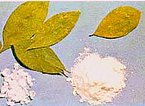Bolivian President Morales came into office with a platform supporting private coca farming. The leaves have known benefits for those working in high altitudes. Others swear by their energy producing benefits. Apparently, their historic use in ancient civilizations reinforce that there are nutritional benefits too.


According to Dr. Roger Sullivan (University of Auckland)
“People's diets may have been so poor that they struggled to produce enough chemicals to help the brain function normally. Consuming plants containing substances that mimic the role of these chemicals could have helped make up for the shortfall. For example, 100 grams of coca leaf contains more than the US recommended daily intake of calcium, phosphorus, iron, and vitamins A, B2 and E.In addition, Dr Wayne Hall {University of Queensland) states:
"There is certainly evidence that plants evolved to mimic the neurotransmitters of mammals.
Uses of the coca plant for medicinal purposes were popular for many years. In 1961, after a study reported the toxic qualities of coca, its consumption was criminalized in an international treaty. However, some scientists questioned the results of that study.
In a 1981 report for the American Journal of Epidemiology, Andrew Weil stated that;
“Coca in leaf form does not produce toxicity or dependence.” He suggested that it had useful benefits for treating gastrointestinal ailments and motion sickness.
The World Health Organization branch of the United Nations sponsored an extensive study of coca/cocaine. For three years over forty researchers examined its use and effects throughout the world.
According to their press release in 1995, they concluded, “Use of coca leaves appears to have no negative health effects; and has positive, therapeutic, sacred, and social functions for indigenous Andean populations.”
It went on to state, “There needs to be more assessment of the adverse effects of current policies and strategies and development of innovative approaches.”
Due to political pressure (and threats to remove funding) by the United States the final report was never released.


Every source I consulted agreed that consuming the leaf is unlikely to produce a high. The small quantities of stimulant in each leaf were not considered dangerous. Interestingly enough, Choquehuanca’s suggestion has merit. Some day we may be “Cuckoo for Coca Leaves” or hear alternative slogans such as “Coca, it’s not just for breakfast any more.”
Links to sources
Washington Times:
BBC (Auckland, Hall quotes)
http://news.bbc.co.uk/1/hi/health/1896275.stm
TransNational Institute and UN/WHO Studies
http://www.tni.org/media/drugdebate.htm








